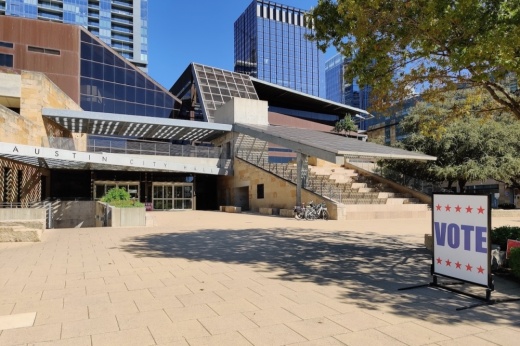After several months of discussion and public feedback, Austin’s 2024 Charter Review Commission presented nine possible adjustments to the resident petition process to City Council on April 16.
Residents can petition the city to enact policy changes, remove officials and more. Last March, council members asked the commission to propose a “durable threshold” for the number of signatures needed to put a petition on the ballot and consider limiting certain petition contests to November elections.
The background
In 2012, Austin voters reduced the signature threshold for initiative petitions, referendums and charter amendments to 5% of the city’s eligible voters or 20,000 voters, whichever is smaller. The 20,000-signature requirement applies at this time. The city had previously required that 10% of eligible voters sign petitions to place them on the ballot.
Austin’s 20,000-person signature threshold is significantly lower than that of other large Texas cities, Community Impact previously reported.
Austin voters have faced a series of resident petition elections in recent years, including two competing police oversight proposals last May.
The four types of petitions residents can bring to City Council are:
- Initiatives to enact specific policies. At least 20,000 signatures are required to place initiatives on the ballot.
- Referendums to repeal ordinances adopted by City Council. The 20,000-signature threshold also applies.
- Recalls to remove the mayor or other council members. Recall petitions must be signed by 10% of the official’s constituency.
- Charter amendments to edit the City Charter document. At least 20,000 signatures are required.
The 11-member charter review commission shared nine possible changes to the petition process with City Council, including:
- Cycling through the alphabet when labeling propositions, instead of beginning with “Proposition A” for every election. Commissioners said this change would help minimize voter confusion.
- Requiring signatures from at least 3.5% of eligible voters to place initiative and referendum petitions on the ballot. Commissioners said 3.5% of eligible voters is about 20,000 people, but this number could increase as Austin’s population grows.
- Requiring petitioners to publicly file a “notice of intent” before submitting a petition. The notice, which commissioners said would improve transparency, would include a description of the petition’s purpose and contact information for the petitioners.
- Moving elections on initiatives and charter amendments to municipal general elections, which are held in November of even-numbered years. Turnout is typically higher during these elections as residents also vote for federal, state and local officials.
- Mandating that the proposition with the highest amount of votes is implemented if voters approve two conflicting propositions during the same election.
- Setting new campaign contribution limits for recall petitions that align with existing campaign finance standards for council and mayoral candidates.
- Increasing the threshold for City Council recall petitions from 10% to 15% of the council member’s constituency.
- Requiring that City Council approve the appointment and removal of the city attorney. Unlike most other Texas cities, Austin’s city manager can appoint an attorney without council approval.
- Designating a specific assistant city attorney to work directly with City Council on policy matters.
City staff also shared around two dozen proposed changes to Austin’s charter document during the April 16 meeting.
Some recommendations, such as adjustments to property annexation rules and the city’s employee retirement system guidelines, aim to ensure the charter language aligns with state law.
Staff also recommended:
- Requiring that special elections to fill City Council vacancies be held within 120 days after the vacancy occurs. Special vacancy elections are held on statewide uniform election dates, which may occur in May or November.
- Creating a 30-day deadline for new council district boundaries to take effect after they are adopted by the Independent Citizens Redistricting Commission. City staff said there is no uniform effective date.
- Giving the city manager authority to execute and amend city contracts worth up to $150,000. City council has to approve all contracts worth $76,000 and above, and city staff said this change would take about 40 contracts off council members’ plates.
In early May, council members will likely discuss which proposals should be placed on the ballot. City Council has until Aug. 19 to order that items be added to the November ballot, according to city documents.





